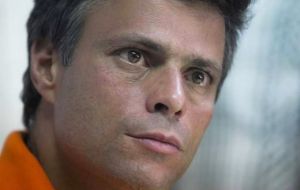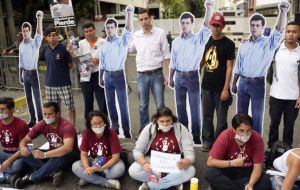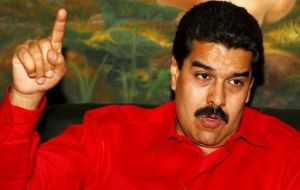MercoPress. South Atlantic News Agency
Hard-line opposition leader Lopez on trial; defense evidence thrown out
 The opposition leader was arrested on February 18 after he spoke at a demonstration that turned violent
The opposition leader was arrested on February 18 after he spoke at a demonstration that turned violent  Dozens of National Guard officers and riot police have blocked access to the court with sitting judge Susana Barreiros.
Dozens of National Guard officers and riot police have blocked access to the court with sitting judge Susana Barreiros.  President Maduro said López “has to pay for his crimes” and accused him of being responsible for the “loss of life” during protests
President Maduro said López “has to pay for his crimes” and accused him of being responsible for the “loss of life” during protests The trial against Venezuelan hard-line opposition leader Leopoldo Lopez, who is accused of inciting violence at anti-government protests has began in Caracas. Lopez could face up to 13 years in jail if convicted.
The opposition leader was arrested on February 18 after he spoke at a demonstration that turned violent and marked the start of three months of deadly street protests. While the protest movement has mostly died down, and opposition leaders have begun to fight among themselves, López has remained in a jail cell.
Over the past five months, he has become a cause célébre for critics of Venezuela’s Socialist government.
In a press conference President Nicolás Maduro told foreign correspondents that López “has to pay for his crimes” and accused him of being responsible for the “loss of life” during protests.
Dozens of National Guard officers and riot police have blocked access to the court. The trial is headed by judge Susana Barreiros.
“We are facing trial without being allowed to present evidence. How are we going to prove his innocence if this trial begins in a state of powerlessness?” Juan Carlos Gutierrez, one of Lopez defense attorneys.
Gutierrez claimed that judge Barreiros rejected a recusal request made by the defense in a bid to delay trial until an Appeals Court rules on whether evidence should be admitted. He said the evidence includes footage of incidents that took place before February 12 and previous speeches by Lopez.
“All the evidence presented by the Prosecutors’ office was admitted and they rejected everything provided by the defense,” he detailed.
In June, judge Adriana Lopez determined — after a very long preliminary hearing that had been postponed for months — that the opposition leader would wait for his trial at the suburban prison of Ramo Verde and admitted the charges presented by the prosecution, including inciting violence and encouraging demonstrators to vandalize government buildings.
At the time, Lopez said that the judge had “sold her conscience to corrupt power.”
Lopez’s lawyers say that, during the June hearing, the prosecution failed to show any evidence to link the opposition leader to the violent incidents of February 12, when three people were killed and dozens injured during anti-government demonstrations in Caracas.
At least 43 people died during the three months of protests that followed.
López and former lawmaker María Corina Machado — who was stripped of her seat in March — represent the more radical line of the Venezuelan opposition. Prior to the violence in February, the two leaders spearheaded a campaign under the slogan “The Exit,” intended to force Maduro to resign.
Their bloc of hardliners has opposed dialogue with the government and has slammed the more moderate MUD for engaging in negotiations with the Chavista administration in a bid to put an end to months of violent demonstrations. The talks were eventually called off by the opposition coalition, which accused the government of the failure.
However moderate opposition leader and former presidential candidate Henrique Capriles said that “none of the differences we might have will be more important than our hopes for unity, freedom, justice, progress and change.”




Top Comments
Disclaimer & comment rules-

-

-

Read all commentsThis is an absolute scandal.
Jul 25th, 2014 - 12:34 am 0“hard-line opposition leader ”,
....after he spoke at a demonstration that turned violent and marked the start of three months of deadly street protests.
he is accused of treason?
So, pre-judice...
“Maduro told foreign correspondents that López “has to pay for his crimes” and accused him of being responsible for the “loss of life” during protests.”
see above.
and
“He has to pay and will pay, it's that simple” says Maduro. So no bias then?
http://www.bbc.co.uk/news/world-latin-america-28472220
This is a total kangaroo-court.
As for Mercopress “Their bloc of hardliners has opposed dialogue with the government ”
They did not, they just refuse to participate in a mockery of a so-called dialogue where they were not permitted to speak, so withdrew.
more background here;
http://www.bbc.co.uk/news/world-latin-america-28472220
http://www.bbc.co.uk/news/world-latin-america-28472220
Did anyone expect him to get a fair trial?
Jul 25th, 2014 - 12:37 am 0Not really, to be frank, I have been expecting this for a long time.
Jul 25th, 2014 - 01:01 am 0One of the few remaining quality newspapers in Vnzla reported this back in Feb.
EL UNIVERSAL
Thursday February 27, 2014 03:35 PM
“The principal human rights abuses” recorded in Venezuela included “corruption, politicization of the judicial system, and government actions to impede freedom of expression and restrict freedom of the press,” reported on Thursday the US State Department.
More here
http://www.eluniversal.com/nacional-y-politica/140227/us-government-laments-politicization-of-venezuelan-judiciary
Venenezuela and Argentine Courts are some of the most currupt worldwide. They are the most politically influenced on the planet:
”The World Economic Forum (WEF) gave Latin America a red card after reviewing its independent judiciary. The Global Competitiveness Report 2013-2014 published by the Swiss-based organization describes a concerning scenario for this region. It ranks the judicial systems of Venezuela, Paraguay, and Argentina among the worst on the planet.”
http://www.eluniversal.com/nacional-y-politica/140227/us-government-laments-politicization-of-venezuelan-judiciary
Commenting for this story is now closed.
If you have a Facebook account, become a fan and comment on our Facebook Page!